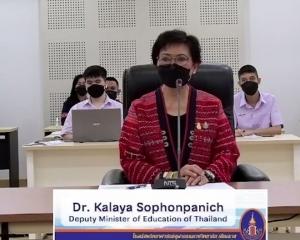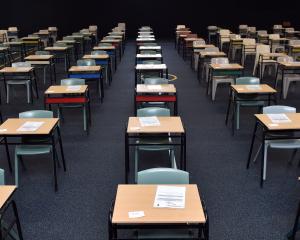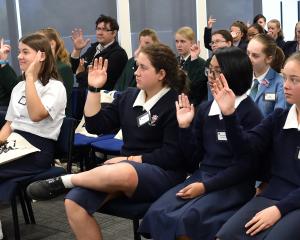The acting principal of a lower decile school, who did not want to be identified, said the "majority" of children she saw could not tell the difference between a number and a letter, identify colours or form a complete sentence.
"We are starting right back at the very beginning.
"They can't cut with scissors, they can't work with paper and pencils. There is a concern," she said.
Despite these children attending kindergartens and pre-school centres, they were developmentally stunted and she believed it came down to home environments having changed.
"I'd like to see parents doing more with their children - reading to them, taking them to parks and on walks."
Standards had been "slipping" in the "last few years" and were getting progressively worse.
"There is too much PlayStation and TV now."
The issue had been "discussed a lot lately" and she hoped the children who were "behind their chronological age straight away" would be able to catch up.
At Pine Hill School, about two-thirds of children came well prepared to start learning.
Principal Melanie Jewiss said they came from a "range of backgrounds and a range of early childhood programmes", which had been doing good work.
However, those children who came with "very little experience" were "most definitely" a concern for teachers.
She described lack of oral language as one of the biggest barriers to learning.
In recent years, oral language skills had deteriorated and she found more children requiring support.
"I think a lot of it is about parents and the wider family taking time to talk to children and giving them experiences," Mrs Jewiss said.
At St Clair School, the experience was similar, with principal Richard Newton describing new entrants as a real "cross section".
While some children were well socialised, could write some words and had a strong vocabulary, the spectrum moved down to some who had limited vocabulary and had difficulty in relating to their peers.
It took the whole community to raise a child, from committed parents, grandparents, neighbours and teachers, he said.
Early childhood centres were doing a "fantastic" job, but "major shifts in the way society operates" were having an impact.
Schools could not be relied on for every aspect of a child's development and they needed rich and stimulating experiences at home as well.
"Heavy use of TV as a babysitter is having a negative impact on young learners.
TV and computer games are inappropriate substitutes for doing other things with the family," Mr Newton said.
The impact on children could be them having esteem issues and moving through the education system feeling as though they were always trying to catch up.
Otago Primary Principals Association president Steve Hayward said the number of pupils with "quite severe" needs was increasing across the country.
In order to combat this increase, many early childhood centres had developed programmes which linked with primary schools in order to provide "seamless education".
Due to "excellent relationships" between support agencies and principals, support was more forthcoming in Dunedin.
Rather than introduce national standards in reading, writing and numeracy, Mr Hayward would prefer the Government allocated adequate resources to schools, which was not currently happening.
"We are not starting on a level playing field."
He wanted to give kids a "hand up, not a hand out" to access support they needed.
"If we don't do this for the children, then who else is going to?"
New entrants
Primary teachers and principals would like new entrants to:
- Have the ability to form friendships.
- Know what a book is.
- Have had some time holding a pencil or crayon in the correct grip.
- Be able to read and write their name.
- Have an understanding of letters and words.
- Be independent; carry their own bag and hang up their jacket.
- Be able to speak clearly and in sentences.











